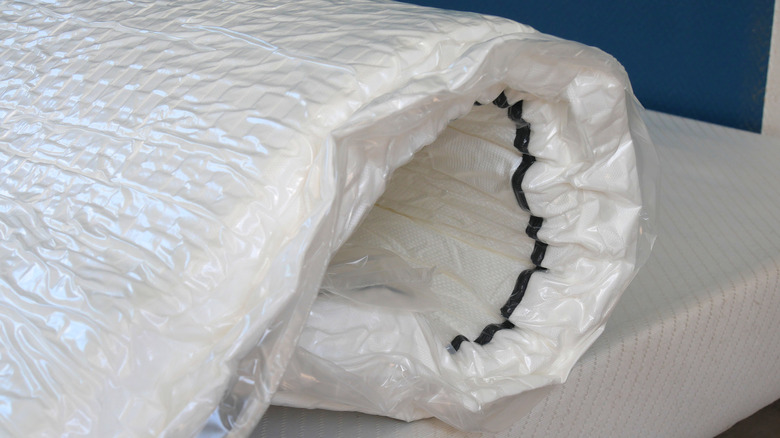The Major Drawback Of Bed-In-A-Box Mattresses You Need To Know About
There are some things in life that are just not worth economizing on, and a good mattress is at the top of the list. A good night's sleep can completely change the course of your day, and, by extension, basically that of your life. Now, a good mattress alone can't guarantee healthy slumber, but without one, the job's much harder (if not impossible). With all the options available, choosing the best mattress for your needs can be a daunting task, so it's best to be well informed about every variable. You'll likely come across many bed-in-a-box mattresses in your search, but if you hold product lifespan and sustainability among your priorities, you might want to consider other options.
Mattress compression for easier shipping has become ubiquitous over the last decade. Not only does it cut costs, benefiting the wallets of both manufacturer and consumer, but packing a mattress in a box is also very favorable to online shopping, a model which has completely taken over shopping habits. The major drawback, as with many cost-cutting endeavors, is that the process could potentially sacrifice product quality. Some mattress companies claim that foam and coils are never the same after being vacuum-packaged, so the money you save upfront when opting for one of these beds could be canceled out later if you're forced to replace it earlier than expected.
Why bed-in-a-box mattresses may not last
There are undeniable benefits to buying a bed-in-a-box mattress. They're practical, easy to transport, and often more affordable, too. Sellers even provide money-back trial periods to make up for the anxieties of shopping for a mattress online without ever feeling it in person. It can seem like the right choice on so many fronts, but one factor is more controversial: durability.
Mattress tech has had many breakthroughs, but companies like Saatva say you can't expect materials like foam and coils to come out unscathed from the brutal process of compressing, folding, and rolling. Whether you're buying a hybrid or memory foam mattress, these operations can break some of the foam's cells, as well as put pressure on, or even wreck, the coils, thus aging the product before it's even been used. Saatva, which does not sell beds in boxes, says that many brands choose less dense foam and thinner wire coils for their mattresses to facilitate vacuum packaging. But bed-in-a-box companies disagree, claiming their materials are often higher-quality than traditional beds.
All mattresses will eventually sag, but the denser the foam and the stronger the coils, the more you can delay this process. Reducing the amount of mattresses you go through in your lifetime is not only advantageous for your finances, but for the planet, too. According to the Mattress Recycling Council, over 50,000 mattresses are thrown away every day, with many ending up in landfills. Investing in a higher-quality mattress that will last you for over a decade is a better choice all around, so it's worth thinking twice about beds-in-boxes and scouring reviews before any purchase.

